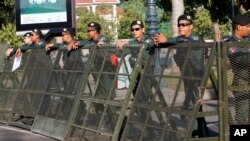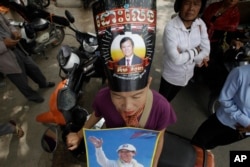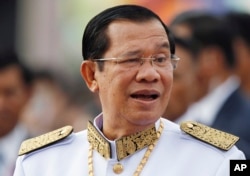Cambodia's Supreme Court has dissolved the country's main opposition party in a ruling likely to cement Prime Minister Hun Sen's already expansive grip on power.
Thursday's unanimous ruling by the nine-member court also bans 118 members of the now-defunct Cambodia National Rescue Party from any political activity for the next five years. The court sided with a lawsuit filed by Hun Sen's ruling Cambodian People's Party, accusing the CNRP of being involved in a foreign-backed plot to topple the government.
The United States and other countries accused by the ruling party have denied backing any subversive plots.
The ruling caps a crackdown on dissenting voices launched by the prime minister ahead of next year's parliamentary elections. The repressive moves include the arrest of CNRP leader Kem Sokha on charges of treason, which led half of the party's lawmakers to flee, and the closure of The Cambodia Daily, one of the country's last independent newspapers, after the publishers received an exorbitant overdue tax bill they said was bogus.
In a statement Thursday, the White House expressed grave concern about the Cambodian government’s action, “based on meritless and politicized allegations” that CNRP “participated in a conspiracy to overthrow the government.”
The White House called on the government of Cambodia to “undo its recent actions against the CNRP,” release its leader, and allow the legitimate activities of opposition parties, civil society, and the media.
The Cambodian government’s restrictions on civil society, suppression of the press, and banning of opposition leaders from political activities “have significantly set back Cambodia’s democratic development and placed its economic growth and international standing at risk,” the statement said, adding that the U.S. will take concrete steps in face of such “deeply regrettable actions” of Cambodian government.
End of fledgling democracy?
The dissolution of Cambodia’s only credible opposition party effectively leaves the country as a one-party state, which critics say could spell the end of more than 25 years of efforts to implement democracy the country.
For those Cambodians who spent years trying to build a representative and democratic government, the ruling is a painful blow that raises hard questions.
The massive, $1.6 billion U.N.-backed effort to seed democracy in Cambodia started in 1992, when U.N. personnel began flooding into the country to build the institutions to support a new democratic government.
In 1993, a wide-eyed TV news assistant named Chhorn Bunhom returned to the country he had fled as a petrified 6-year-old to cover this extraordinary intervention.
“I’m on top of this aussie U.N. car/van and you can see little kids jumping up and down think that, you know, the U.N. is here to save them,” he said, recalling his entry into the country across the Thai border in Poipet.
Working as a sound recordist and camera assistant Bunhom had been flung right into an explosion of euphoric enthusiasm in a country that had known little else than misery and horrific violence for decades.
The United Nations Transitional Authority in Cambodia had come to bring democracy.
With it came not only the possibility of an end to authoritarian rule but a transformative injection of economic activity both through direct investments and commerce generated by the hedonistic excesses of some 20,000 foreign peacekeepers.
“It’s like somebody bought a million dollar fire cracker and just lit it up in the middle of the night in Cambodia and that’s what I felt like - Cambodia all of a sudden had light,” he said.
Today, nearly 25 years later, a generation enlisted to build an idealistic new vision of Cambodia can only watch with dismay.
Echoes of Cambodia's dark past
This week, a 65 hectare area surrounding the Supreme Court was on lockdown with only the odd confused tourist trying to leave or return to a hotel and a small contingent of journalists allowed in.
Two journalists, Oun Chhin and Yeang Sothearin, were arrested on Tuesday and will reportedly be charged with espionage on accusations they provided information to their employer Radio Free Asia - which shut down its Cambodia operations last month citing intimidation.
The night before the court hearing, security forces made up of police, military police and guards made coordinated visits the offices of prominent human rights NGOs such as Adhoc and Licadho to check if they were harboring protesters, while roadblocks were set up on major arterials into the city.
It’s an environment Chin Channa, a translator for the Khmer Rouge Tribunal who championed its creation back at the turn of the century, remembers only too well from his days as a monk before the 1993 election.
Back then his enthusiasm for the royalist revival of Prince Norodom Ranariddh’s opposition FUNCINPEC party constantly got him in trouble with authorities and his superiors in the clergy.
“A lot of monks were afraid but for me I did not feel any fear,” he said, adding he was chased out of a temple in Battambang by a chief abbott infuriated with his incessant politicking.
Channa believes governance programs in Cambodia have failed only because of the ruling party's resistance.
“This has worked so far. I’ve been working with many organizations and those organizations have trained a lot of Cambodian people including government officials, police officers, judges, prosecutors, lawyers and students so they been exposed to this new leadership and governance system," Channa said. “But the ruling party has never been able to maintain this momentum, they tried to bring Cambodia back to the communist way of leadership."
Lack of compromise
Thida Khus, who helped bring back many Cambodian Americans to the country in 1993 to help set up civil society organizations and teach in universities, says there are many reasons why UNTAC’s mission ultimately failed.
She provided input into the drafting of the constitution and later founded the organization SILAKA to encourage Cambodian women to take greater participation in politics - exposing her constantly to the country’s evolving political culture.
“Cambodians don’t like to confront each other if they don’t agree with each other - they’d rather walk out of a situation. But in a democracy sometimes you need to be persistent and not to compromise and many of the Cambodians do a lot of compromise since the election of the U.N.,” she said.
Khus says that while human rights education in Cambodia has been extensive, until recent there were few efforts to teach the public about political rights and democratic culture.
Bunhom, now a documentary filmmaker and TV producer, says western countries were naive to think that democracy can be grown "like a tree."
“I think democracy is very much like a system of thinking and that is, when you want a person to change his or her way of thinking, you really need to argue your point and you really need to be there among them."










